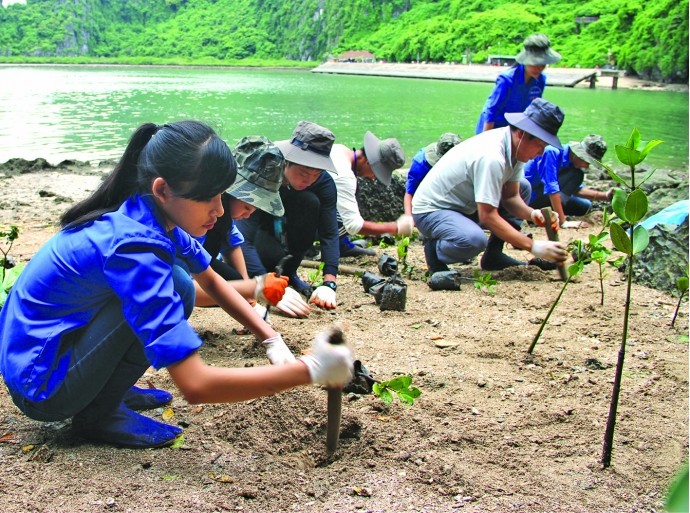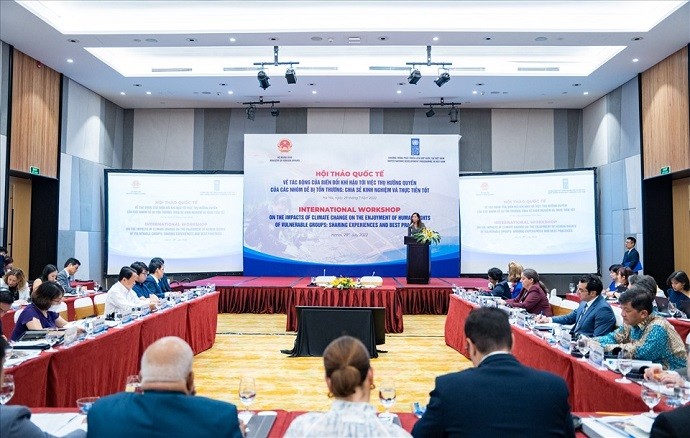(VOVWORLD) - Climate change can undercut development achievements and threaten fundamental human rights. Vietnam has been working with the international community to respond to natural disasters, minimize the impact of climate change on society, and ensure people’s right to live safely and healthily. Vietnam’s activities follow a policy of ensuring human rights, especially for vulnerable groups, against the impacts of climate change.
 Volunteers grow trees for salt marshes at Dau Go island in Quang Ninh province (Photo: Ngo Yen/baogiaothong.vn) Volunteers grow trees for salt marshes at Dau Go island in Quang Ninh province (Photo: Ngo Yen/baogiaothong.vn) |
Vietnam is one of the most vulnerable countries in the world to climate change due to its long coastline. It is estimated that if the sea level rises 1 meter, 40% of the Mekong Delta and 10% of the Red River Delta will be flooded, directly threatening the lives of 20 to 30 million people.
Climate change has seriously impacted poverty reduction, the Millennium Development Goals, and Vietnam’s sustainable development targets. It will reduce national income an estimated 3.5% by 2050 and affect about 74% of the population, particularly women and girls, the poor, and people with disabilities.
Global efforts against climate change
Vietnam joined the United Nations Framework Convention on Climate Change (UNFCCC) in 1994 and fulfilled its obligations under the UNFCCC, the Kyoto Protocol, and the Paris Agreement on Climate Change.
Vietnam submitted its Intended Nationally Determined Contribution (INDC) to the UNFCCC in 2015 and updated it in 2020. Vietnam was one of the first 20 countries to complete an INDC review and update, and increased its commitment to greenhouse gas emission reduction by 2030.
 International workshop on the impacts of climate change on the enjoyment of vulnerable groups: sharing experience and good practices” on July 29, 2022. (Photo: MOF) International workshop on the impacts of climate change on the enjoyment of vulnerable groups: sharing experience and good practices” on July 29, 2022. (Photo: MOF) |
Vietnam is committed to reducing its total greenhouse gas emissions at least 9%, equivalent to nearly 84 million tons of CO2, and as much as 27%, equivalent to 250 million tons of CO2, with international support through bilateral and multilateral cooperation and business investment.
Vietnam has issued a National Plan to Adapt to Climate Change for the 2021-2030 period, with a vision to 2050, which targets stronger resilience and adaptive capacity by the community, economic sectors, and ecosystems against climate change and integration of climate change adaptation into the national economic development strategy.
In recent years Vietnam has implemented a number of programs to respond to climate change, particularly sea level rise in the Mekong Delta, the Red River Delta, and coastal areas.
Reducing greenhouse gas emissions is a mandatory requirement for all organizations and individuals living and working in Vietnam and has been stipulated in the revised Law on Environmental Protection 2020. Vietnam was one of the first developing countries to include the obligation to reduce greenhouse gas emissions in new laws and to treat greenhouse gas emission mitigation and climate change response as the responsibility of the entire political system.
Protecting human rights against climate change
Protecting human rights against climate change has been built into Vietnamese law to reflect international treaties Vietnam has joined. The country has worked with the UN to implement resolutions on climate change and human rights, focusing on the rights of children, women, the elderly, and migrants. Vietnam has enhanced efforts to fulfill the commitments it made at the 26th UN Conference on Climate Change (COP26), including achieving net-zero carbon emissions by 2050, and other international conventions.